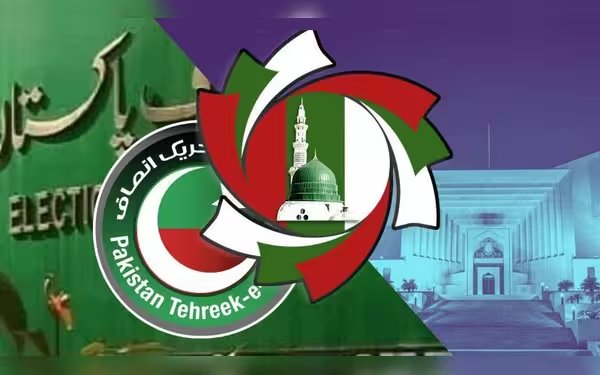Saturday, November 16, 2024 07:52 PM
Supreme Court Directs ECP to Recognize PTI Membership for Independents
- Supreme Court clarifies status of independent candidates.
- ECP's delay tactics criticized by the court.
- 39 candidates affiliated with PTI during nominations.
 Image Credits: thefridaytimes
Image Credits: thefridaytimesSupreme Court mandates ECP to register independent candidates as PTI members, emphasizing clarity in political affiliations.
The recent ruling by the Supreme Court of Pakistan has brought significant clarity to the political landscape, particularly concerning the status of independent candidates who have been elected to the National Assembly and Provincial Assemblies. On Saturday, the court issued a crucial clarification regarding its earlier order, which mandated the Election Commission of Pakistan (ECP) to register all returned candidates as members of the Pakistan Tehreek-e-Insaf (PTI) if they had submitted party tickets or certificates during their nomination process. This decision comes at a time when the government was relying on ambiguity surrounding the status of these independent candidates to push for a constitutional amendment that would secure a fixed term for the Chief Justice and subsequent chief justices.
In August, the ECP sought guidance from the Supreme Court to clarify the short order issued by a majority of the judges in a previous ruling. This earlier verdict had established that PTI is a valid political party and that independent candidates should be given the option to choose their parliamentary affiliation. However, the ECP raised concerns about how to confirm the political affiliation of independent candidates in the absence of a recognized organizational structure for PTI.
The Supreme Court's response was firm. The eight judges emphasized that the ECP's request was merely a tactic to delay the implementation of the court's decision. They pointed out that the ECP had already recognized Barrister Gohar Ali Khan as the chairman of PTI, and thus could not seek further clarification on the matter. The court stated, "The Commission cannot approbate and reprobate, taking whatever (shifting) stance as it desires and as may seem to suit its immediate purposes for the moment." This statement underscores the court's frustration with what it perceives as the ECP's attempts to manipulate the situation.
Moreover, the court highlighted that both the majority and minority judges acknowledged the validity of party certificates issued by Barrister Gohar in his capacity as PTI chairman. The judges argued that it would be illogical to assume that a political party could function without individuals managing its affairs. The court warned the ECP that its continued refusal to accept the certifications could lead to legal consequences, emphasizing that the obligations of the ECP must be fulfilled without delay.
As the case unfolded, it was revealed that 39 returned candidates had cited their affiliation with PTI when filing their nomination papers, while 41 others did not list any party affiliation. This revelation adds another layer of complexity to the situation, as it raises questions about the political affiliations of these independent candidates.
The Supreme Court's ruling serves as a pivotal moment in Pakistan's political arena, reinforcing the legitimacy of PTI and its members. The court's insistence on clarity and adherence to constitutional obligations is a reminder of the importance of transparency in the political process. As the situation continues to evolve, it will be crucial for all parties involved to navigate these developments with a commitment to upholding the rule of law and ensuring that the democratic process remains intact.













